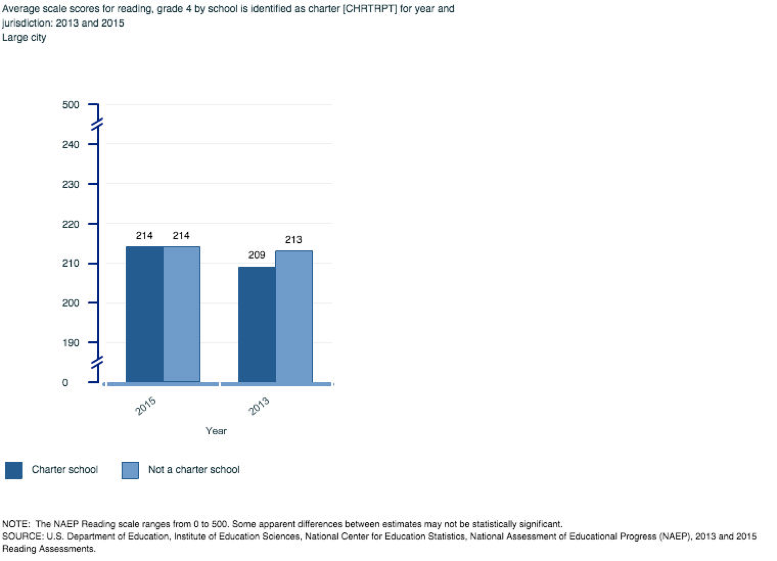Recent analyses of the National Assessment of Educational Progress (NAEP), our nation's most credible "report card" by Dr. Julian Vasquez Heilig show that as a whole, charter school students underperform relative to students in non-charter, neighborhood public schools. The results are particularly stark at the 12th grade level.
Policy implications? We need to continue funding and supporting public schools, rather than trying to dismantle them through charters and we need to start "poaching" the charter schools to get these students back. We also need as a polity to stop acting like "consumers" and assume ownership over public education where we as communities have rights and responsibilities and a great deal of work to do.
Be thoughtful about who you elect to represent you on your school boards. Make sure who funds them. Hopefully, not charter companies because then they're beholding to them and they open up our districts to ever more charter contracts and expansion. And consider running yourself for the school board. And you should be able to win on the basis of what you do for, in, and with your community. You shouldn't have to rely on these dollars either.
Angela Valenzuela
National and Urban NAEP Results: Neighborhood Public Schools 23, Charters 4
This post utilizes data from the National Assessment of Educational Progress (NAEP). The NAEP is conducted by the National Center for Education Statistics and the U.S. Department of Education. The NAEP was “first administered in 1969 and is the largest continuing and nationally representative assessment of what our nation’s students know and can do in subjects such as mathematics, reading, science, and writing.” Standard administration practices are implemented to provide a common measure of student achievement and is consider “the nation’s report card.”
For this blog post, the NAEP Data Explorer tool was used to compare student performance results at the national and large city level. Composite scale scores were compared for charter schools vs. non-charter neighborhood public schools at the “large cities” level due to the fact that the majority of charters are located in urban areas. We consider the Data Explorer’s publicly available composite reading, mathematics, and science scores for 4th, 8th, and 12th graders over the course of six years (2009-2015). This post includes a school-level analysis due to the fact that the student-level data is not publicly available online (For student-level NAEP data comparisons see for example School Sector and Academic Achievement: A Multilevel Analysis of NAEP Mathematics Data).
Results
One would most likely suspect from the current positive public discourse about charter schools that they would display higher national and large city NAEP performance when compared non-charter neighborhood schools, however, this is not actually the case when examining achievement data at the school level. Out of the 28 total comparison tests run, only 4 times did charters produce higher composite score averages than non-charter neighborhood public schools— 8th grade reading and math in the years 2013 and 2015. There was a tie in the large city comparison for 4th grade reading in the year 2013 as charter schools and non-charter neighborhood public schools displayed the same average composite scale scores. In the other 23 cases charter schools produced lower average composite scores on the NAEP (math, reading, science) than non-charter neighborhood public schools.
What were the average differences between charters and non-charter neighborhood public schools? Overall, the 18 comparisons utilizing national samples of non-charter neighborhood public schools displayed composite scores 9.3 points higher on average than charter schools. For the ten available comparisons using samples from large cities, non-charter neighborhood public schools displayed composite scores 0.3 points higher on average than charter schools. Thus, the predominant finding is that non-charter neighborhood public schools outperform charters in the NAEP results on average.
The stark difference in student achievement between charters and non-charters is extraordinarily large in the final year of high school. The national comparisons in the 12th grade show about ~20 point differences favoring non-charter neighborhood public schools in reading, math and science over charters. Of note, the 12th grade comparisons are only at the national level because data for comparisons were not available at time of writing for large cities in the NAEP Data Explorer.
In conclusion, the school-level national and large city NAEP results drawn from the Data Explorer are informative for the public discourse as charter schools are presently being presented as a superior alternative to the public school system. These descriptive school-level results from the NAEP Data Explorer suggest that the relationship between charter schools and improved student performance is not being realized nationally and in large cities. As a result, the present conversations promoting outstanding overall success of charter schools clearly need to be reconsidered and reframed.
4th Grade Composite Score Comparisons (National and Large City)
Mathematics


Reading



No comments:
Post a Comment